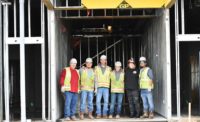ENR 2018 Top 25 Newsmakers
Kevin Bagnall: Pavement Entrepreneur Uses Recycled Tires to Protect Environment in Yellowstone National Park

KBI Industries, Inc. founder Kevin Bagnall credits his coal miner father Kenneth for his work ethic and “extreme tenacity.”
PHOTO COURTESY K.B. INDUSTRIES INC.
Growing up in the South Yorkshire mining village of Grimethorpe, England, Kevin Bagnall saw firsthand the effect humans can have on the environment.
“Seeing my father come home every day with all the coal-mining grime on his face, it always shocked me,” Bagnall says. “To have a cleaner environment, we have to have people thinking better about what we leave for our grandchildren.”
To that end, Bagnall’s company, K.B. Industries Inc. (KBI), finished installing its proprietary pavement made of recycled tires and other material at Yellowstone National Park in September. The three-year project was the company’s first at a national park, laying 14,000 sq ft of pavement near Old Faithful.
KBI’s Flexi-Pave’s clean, porous surface returns rain and snow to the water basin. “As urbanization increases, population density increases. Waste streams increase. Tire waste increases,” Bagnall says. “But fresh water is not increasing.”
The pavement allows 3,000-plus gallons of groundwater to pass per sq ft per hour. Rubber granules and stone are held together by a polymer binding agent that is inert when cured. The product also doesn’t leach pollutants into the ground or break apart like asphalt. “Asphalt chunks are kicked or thrown into the pools” by tourists, affecting the natural composition of the water, says Jeff Augustin, senior director of park projects with park nonprofit Yellowstone Forever.
The company and Michelin, which has donated about $300,000 worth of tires to the park’s vehicles and equipment since 2007, suggested the project to the nonprofit. Several states and municipalities use the product, and other national parks are interested.
Bagnall left Grimethorpe at age 16 to become a Royal Navy diver. He later returned to Yorkshire, working as a firefighter and doing construction on his days off. Bagnall used rubber surfacing while building a play area and saw an opportunity, forming a company that expanded to the U.S. He founded KBI in Florida in 2002 and it has since grown worldwide.
KBI’s business model allows the company to improve the environment without government grants, while forming a new marketplace for recycled tires and creating jobs. “This company has always supported itself,” Bagnall says. “We can only have a positive effect on the environment if we produce profit dollars.”


